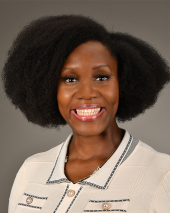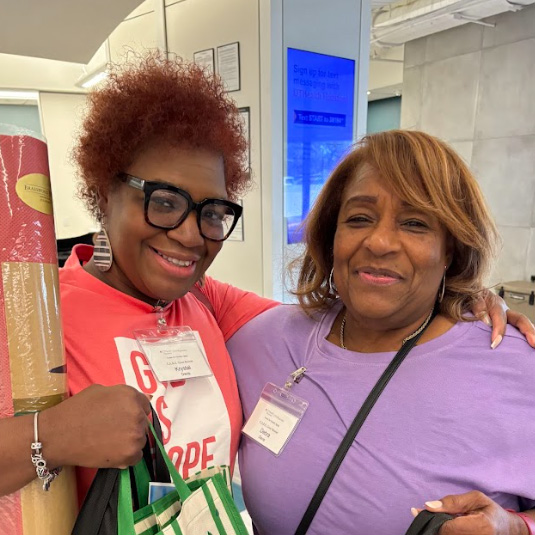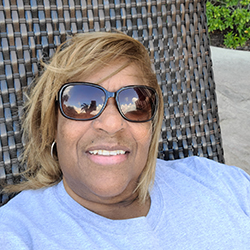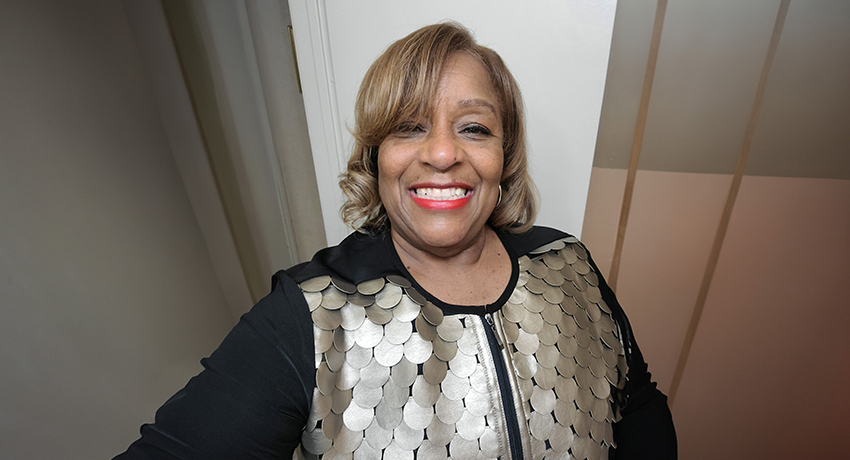Serving as a caregiver for a parent, spouse, or a child with special needs can be bittersweet. There can be heartwarming moments one day and heart-wrenching struggles the next. For some, it can lead to a loss of self as they focus on others.
Debra Davis is a mother, grandmother, wife, sister, and friend to many. Her role as daughter, however, became her main focus when her mother started declining with symptoms of dementia more than 10 years ago. Debra’s mother, now 91, receives care from Debra and Ernestine, an outside care provider who comes to her mother’s home. It’s been a journey, however, to get to this place.
Choosing geriatric care
Debra and her mother are both patients of Maureen S. Beck, DNP, co-director of UT Physicians Center for Healthy Aging. Beck has provided geriatric-focused care for Debra’s mom since 2011, in the early days of the center. Five years ago, Debra also began seeing Beck because she liked how she treated her mom.
A virtual caregiver support group is available to all Center for Healthy Aging patients. This support group changed Debra’s life.
Learning boundaries

Debra and her daughter, Krystal, started attending the caregiver support group in 2022. Crystal L. Walter, a licensed clinical social worker at UT Physicians Center for Healthy Aging – Bellaire Station, said Debra struggled with setting boundaries initially and making space to be a daughter and a caregiver. She felt guilty allowing someone else to care for her mom and considered it her duty to do it all.
“Debra was so focused on pleasing her mom and didn’t understand that her mom couldn’t even comprehend some of the lengths she was going through to help,” said Walter, who can personally relate after caring for her father for 13 years. “It’s important for caregivers to understand they have so many other roles than being a caregiver. You want to be healthy in mind, body, and spirit to be a healthy caregiver.”
Adapting to changes
Dementia progresses through various stages with new, unique challenges. Clinginess has intensified for Debra’s mom recently. As a result, she pretends to cry when Debra needs to leave her home, which pulls at her heartstrings. Debra gently tells her, “Mom, I need to regroup. If I don’t go, and I break, I don’t know what will happen to us.” Debra’s 6-year-old grandson recognizes this pattern and tries to console them both.
It’s a delicate balance between meeting her mom’s emotional needs and maintaining her own well-being.
“I’m doing the best I can, but I have to get some energy and strength,” Debra said. “I’m tired because I don’t sleep when she’s here.”
Making time for herself
Debra looks forward to the support group meetings held on the fourth Wednesday of each month. The structured time allows Debra to sit and be present. It provides a safe space for Debra to share experiences, listen, and engage with others who truly understand the challenges of caring for someone. Debra hears ideas that have worked for others.
“Crystal’s ability to engage the group fosters a sense of community and understanding,” Debra said. “Laughter, even in difficult situations, brings relief and camaraderie. It’s a time just for me and so rewarding.”
Recognizing the new face of caregiving
Walter said that the face of caregiving has changed. It’s not only the middle-aged mom. Today, it’s also children in their 50s, 60s, and even 70s caring for their parents and grandchildren simultaneously.
“We need to talk more about that in society,” Walter said. “How does a 75-year-old take care of their parent, who is living to 100, and still find time to ensure they’re taking care of themselves?”
Structuring the group
Walter designed the support group to be virtual because she recognizes from her experience caring for her father the challenge caregivers often face getting away. The membership list has more than 50 caregivers, although monthly attendance varies considerably. Walter works hard to create a no-judgment zone where people can feel comfortable being honest.
“The group is a great space to show up and be you without judgment,” Walter said. “Sometimes we’re harder on ourselves than anyone else can be. It’s a place to process thoughts, forgive ourselves, practice self-compassion, forgive others, and move forward.”
Walter begins each caregiver support group meeting with mindful breathing and self-focus, which allows caregivers to slow down, release tension, and truly listen to their feelings.
Making a difference

Walter said Debra’s growth within the caregiver support group is heartwarming. Debra now recognizes that caregivers wear many hats and that she needs to maintain her well-being in the process.
One significant change is Debra’s willingness to allow someone else to help her. This decision requires courage and vulnerability. Debra grappled with the idea of seeking assistance for over a year.
“Through the caregiver support group, Debra was able to see how this helped other caregivers when they allowed help in the home,” Walter said.
With Walter’s assistance, the family found Ernestine. They recently extended her hours so she can put Debra’s mom to bed at night. Walter said Debra eventually understood that being open to help allowed her to be an even better daughter.
“By allowing her village to expand and embracing help, Debra is not only fulfilling her role as a daughter but also excelling as a wife, grandmother, and mother,” Walter said. “While no one can replace us entirely, it’s essential to trust others and allow them to contribute. I’m proud of Debra reconciling with that word help.”
Making new memories

Debra’s family spent four days in Galveston in July and visited Moody Gardens. This was a big adventure since it had been nearly two years since she had taken time to get away and travel out of town.
Debra told herself this year would be a new one for her as she’ll turn 70. This is her bucket list year, as she calls it. She intends to check off as many things on her list as she can. One example, she said, is going back to the gym.
“I used to go to the gym regularly and walk, and I haven’t been able to do that. Exercise is one of the things I miss,” Debra said. “I used to love it and want to do it because it makes me feel good.”
Letting go of perfection
Debra’s journey captures the essence of caregiving – compassion, resilience, and the power of community.
“We have to trust that we’re making the best decisions and putting our loved ones in the best places to get the best support so we can do the things we need to do,” Walter said. “It’s not looking for perfection or the best version of yourself, but you need to be healthy and grounded.”



